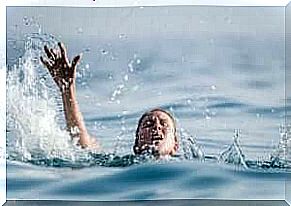Aquaphobia: The Fear Of Water

Water is an absolutely necessary part of life for most living beings. It’s difficult not to be in frequent contact with it somehow, and it’s a big problem for anyone with aquaphobia or fear of water.
Aquaphobia is essentially a disability that a person can develop when they come in contact with water for the first time. This is during the stages of exploration, discovery, and adaptation, and you are reluctant about water (Saquicela and Jacinto, 2010).
Aquaphobia or fear of water is a psychological condition that involves excessive, irrational and unjustified fear of water.
Symptoms of aquaphobia
Physical symptoms
Here are some of the physical symptoms that a person with this fear may experience:
- An increase in heart rate.
- Fast breathing.
- Hyperventilation or a feeling of drowning or suffocation.
- Muscle tension throughout the body.
- Excessive sweating all over the body and / or cold sweat.
- Pain in the abdomen and / or head.
- Liberation from reality or depersonalization.
- Dilated pupils.
- Nausea, dizziness and vomiting.

Mental symptoms
The physical symptoms strengthen the cognitive ones. They cause a series of negative thoughts when a person with this fear is close to the water. These negative thoughts create and cast doubt on their ability to be near the water.
Behavioral symptoms
Avoidance: This is a person who avoids contact with water at all costs. All this does is increase their fear and prevent them from overcoming it.
Escape: When they can not avoid contact, they try to get out of the situation as quickly as possible.
The causes of aquaphobia
According to Calamnia (1993), there are two basic causes of aquaphobia :
- To be taught to fear water or quantities of water. The adults around you transmit their fears, which cause you to make this fears your own, even if you have not experienced it yourself. This is the most common cause.
- Bad experiences or stressful situations with water such as being pushed in.
According to Zubiaur and Gutiérrez (2003), there are several factors to consider when it comes to aquaphobia and motor behavior:
- Fear of cognitive or psychological threats:
- Failure – This is one of the most common causes in children and gets worse as they get older. This may be because they do not trust themselves or do not worry about what will happen if things go wrong.
- To be poorly judged.
- Being socially ridiculed – This plays a big role in adolescence and can often last into adulthood.
- Competition.
- Fear due to physical insecurity:
- Your first experiences with water involve trying to learn unfamiliar movements in an unfamiliar setting. These unfamiliar movements can cause you to lose your spatial orientation or balance and scare you.
- If you add the fact that it is a new situation, that you may be insecure and stressed about doing well, and that fear may be there both during and after, it can become very intense.
How do you treat aquaphobia or fear of water?
As with almost any phobia, exposure therapy is the most common treatment for aquaphobia. This exposure can be done in two ways: Direct or virtual (the latter is done via modern technology).
In either case, you put yourself in the situation you are afraid of, and gradually learn to “unlearn your fear” of water by going from situations that cause the most fear to situations that cause the least.
Doctors often combine exposure therapy with medications that can help people with a phobia respond better to their fears. SSRIs (selective serotonin reuptake inhibitors) can reduce people’s anxiety attacks and panic.
Just remember that these medications are a bandage, not a cure, and have withdrawal symptoms. Be careful about using them in the long run.
Doctors and therapists also use stress reduction techniques such as relaxation, yoga, meditation, etc. There are also more and more people who are in favor of mindfulness and focus on techniques to overcome this kind of fear.









